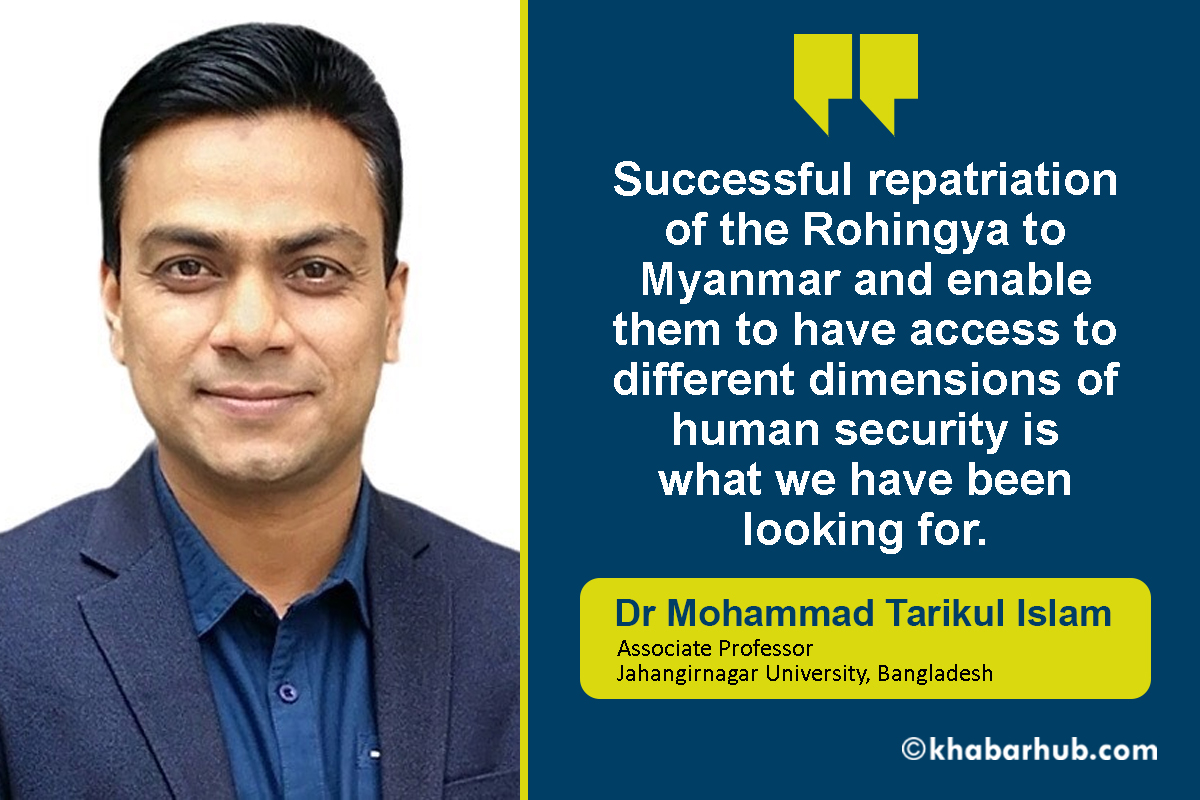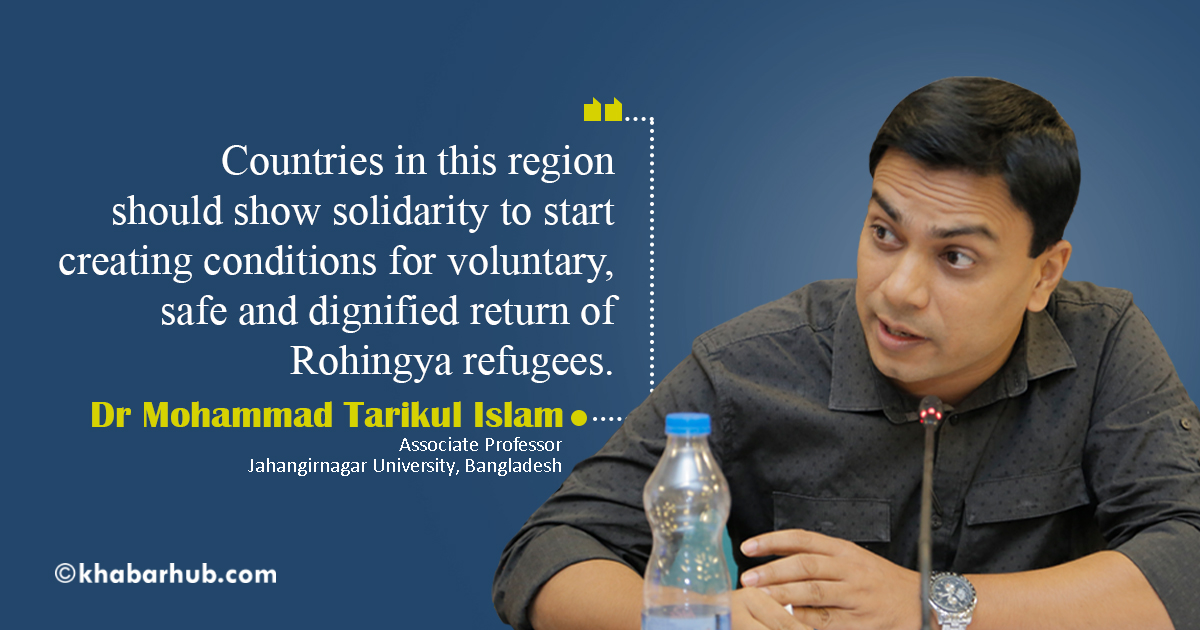KATHMANDU: Dr Mohammad Tarikul Islam is an Associate Professor of Government and Politics at Jahangirnagar University in Bangladesh.
He was the Visiting Research Fellow at the University of Oxford, United Kingdom in 2018.
Prior to joining the University in 2014, Dr Islam was serving United Nations Development Program Bangladesh for a period of seven years in different capacities. Professor Islam had gained hands-on experiences while joining brief mission at UNDP country office in Indonesia, Nepal and China.
In recognition of his persistent academic endeavor towards the causes and consequences of forced migration in Bangladesh with particular focus on Rohingya Refugees, the Centre for the Study of Global Human Movement of the University of Cambridge is engaged Dr Islam as the Centre Associate Member.
Khabarhub had a conversation with Dr Islam on Myanmar’s Rohingya refugees, who are currently languishing in several countries, including Bangladesh and Nepal. Excerpts of the interview:
Bangladesh is hosting over one million Rohingya refugees. What is their current state of human security there?
The Rohingya is an ethnic minority group in Myanmar that has due to persecution, crossed into neighboring Bangladesh over decades, laying uneven pressure on the scarce resources of Bangladesh.
Bangladesh is now hosting around one million Rohingya refugees and this highlights the serious concern of human security.
Myanmar government has been very reluctant to take back their nationals, the Rohingya, despite the robust diplomatic endeavors of Bangladesh government regarding repatriation.
Providing basic provisions of their life like food, shelter, and healthcare have been the utmost priorities at the moment and also for the rest of the period until the return of Rohingya refugees from Bangladesh to Myanmar. Rohingya refugees are seriously at the risk of human trafficking.
Health security and food security are the evolving challenges in the makeshifts where refugees are living.
Even, there is the likelihood of increasing happening of such incidences and aggravating the local social and cultural harmony among the local citizens and the Rohingya refugees.
Can you tell is briefly about the geo-political interests of this issue?
Bangladesh is making every effort in a professional fashion to harness regional and global power to end in amicable solution of this emerging crisis despite the position of China and India on the side of Myanmar on Rohingya issue.
We have noticed both countries are having huge strategic and economic interest in Myanmar.
Even Russia seems like compassionate to Myanmar on this issue. Bangladesh government has been experienced over the months while unveiling their diplomatic efforts in persuading Myanmar to repatriate the refugees.
However, the reality suggests that Bangladesh government may not succeed in sending all of them back even in a single go with the utmost diplomatic niche. Therefore, we may think of some long-term solutions to deal with this additional population in Bangladesh.

Though Myanmar holds no major importance in Russian policy – no geopolitical interests are at stake there, while Moscow’s attitude to the issue in the UN could potentially to upset its Muslim allies, for instance Iran.
Unexpectedly, At least 1,300 Rohingya Muslims had crossed into Bangladesh from India since the beginning of this year as fears of deportation to Myanmar spark an exodus.
New Delhi has faced sharp criticism for turning members of the persecuted minority over to Myanmar despite the army there being accused of atrocities against the Rohingya.
The United Nations has accused India of disregarding international law and returning the Rohingya to possible danger in Buddhist-majority Myanmar.
How is the UN supporting Bangladesh for managing the Rohingya refugees?
Considering the gravity of sufferings Rohingya refugees face, humanitarian, political, law and order, security, development and environmental concerns must be prioritized rethinking different phases of enforcement.
The international community is working closely with the Government of Bangladesh and Myanmar respectively to assist them in working towards voluntary, safe and dignified returns.
They believe, only harmonious returns can break the decades-long cycle of displacement Rohingya community is experiencing.
Memorandum of Understanding (MoU) signed in 2018 between the Government of Myanmar, UNHCR and UNDP is intended to ensure that refugees receive information on the situation in their places of origin and this MoU keeps a provision allowing Rohingya refugees to visit their home villages and other areas where they may choose to return. It also stands for extending transit facilities in Myanmar.
UN agencies, international and national NGOs and government bodies are in a collective effort aiming at delivering protection to the refugees and to provide life-saving assistance and foster social cohesion.
If this problem lingers for a longer time, it may encourage creating pockets of radicalism and that may create problems of uncertainty and instability not only for Myanmar and Bangladesh but for the entire region.
Hence, allowing Rohingyas to go back to their place of origin in Myanmar with freedom of movement and other basic human rights would be the be the best way of showing respect to human rights, we believe.
To help Myanmar create conditions favourable for the Rohingyas to return, the UNDP and UNHCR signed a tripartite deal with Myanmar in June 2018, nearly a year after 740,000 Rohingyas fled military atrocities in Rakhine, which was described as having “genocidal intent” by UN independent investigators.
Why was the second attempt to repatriation of Rohingyas unsuccessful?
The second attempt to start repatriation of Rohingyas to Myanmar on 22 August 2019 was turned out to be futile, as no refugees showed willingness to go back to Arakan.
They have again demanded their citizenship with right to freedom of movement and access to all opportunities.
Myanmar has yet to address the systematic persecution and violence against the Rohingya, so refugees have every reason to fear for their safety if they return.
It has now been apparent that, achieving durable solutions requires the Myanmar government to address the fundamental issues of equal rights and ensure that all communities in the Rakhine State can live in safety, access basic services and pursue livelihoods opportunities.
Can you tell us Bangladesh’s diplomatic endeavor in resolving this issue?
The Bangladesh government has been making diplomatic efforts in persuading Myanmar to repatriate the refugees over the months but in reality, it is highly unlikely the Bangladesh government will succeed in sending the refugees back to Myanmar in a shortest possible time.
Myanmar and Bangladesh agreed in late 2017 to complete the return of hundreds of thousands of Rohingya refugees within two years, notwithstanding international doubts that they will be held in forbidding detention camps that may result in another round of cruelty both physically and psychologically.
British drafted resolution was in support of Bangladesh as it had warned that the 15-member Security Council could consider further steps, including sanctions, if there was not enough progress made by Myanmar for repatriation.
Tell us the outcome of PM Hasina’s visit to China in 2019
Recent visit of Prime Minister Sheikh Hasina in early July in 2019 to China was productive as China assured Bangladesh to stand beside Bangladesh in the repatriation of the Rohingyas. They expressed their interest to help Bangladesh in resolving the Rohingya crisis by convincing the Myanmar government and its leaders through bilateral discussions.
How Bangladesh delegates employs 74th UN General Assembly to put pressure on Myanmar in this regard?
Like in the past, Bangladesh government has kept its efforts continue to encourage other governments to stay engaged and continue to address the pressing needs of these refugees — needs that will only grow as long as this situation remains unresolved.
Apart from her speech in the UN General Assembly, Prime Minister Sheikh Hasina joins a high-level side-event on the situation of Rohingyas in Myanmar organized by the Permanent Mission of Bangladesh and the OIC Secretariat at Conference.
She put forth a fresh set of proposals on how the Rohingya crisis can be resolved when she addresses the UNGA apprising the world leadership of the current situation, and ask the international community to put pressure on Myanmar to take back its own people.
As Bangladesh and India have continued to consolidate their political, economic, trade and cultural relations as well as have built a comprehensive institutional framework to promote bilateral cooperation over the decades, India must come forward to join hands with Bangladesh government for swift repatriation of Rohingya refugees. We also expect China beside Bangladesh to resolve this prolonged crisis.
What is your government doing in protecting Rohingya refugees from COVID-19?
In Bangladesh, so far there are no confirmed cases of COVID-19 infection among the Rohingya refugee population.
To address the risks of a potential outbreak of coronavirus in the camps, the Government of Bangladesh, together with UNHCR and partners, has ensured the inclusion of Rohingya refugees in its national response.
UNHCR and partners have launched construction of isolation and treatment facilities, with the goal of ensuring the availability of 1,900 beds to serve both refugees and host communities.
Information-sharing has been expanded through a network of more than 2,000 community volunteers, religious leaders and humanitarian workers.
To understand the need of the Rohingya as well as preventative measures in the wake of COVID-19, UNHCR, UNICEF, WFP and IOM Representatives meanwhile conducted a joint mission. It is found that, the 2020 Joint Response Plan for the Rohingya Humanitarian Crisis sought some US$877 million to meet the most critical needs before the COVID-19 pandemic began.
How do you anticipate amicable solution of Rohingya problem?
Of course. I am looking forward to the successful repatriation of the Rohingya to Myanmar and enable them to have access to different dimensions of human security.
The United Nations, which is found to be very emphatic for meaningful repatriation of Rohingya refuges from Bangladesh must coordinate and communicate with donors and other relevant stakeholders to come forward to solve this problem permanently by putting pressure on the Myanmar government to take back its citizens by creating a safe and secured environment.
We request countries in this region and beyond to show solidarity with Bangladesh and to support Myanmar to start creating conditions for voluntary, safe and dignified return of Rohingya refugee.
We urge upon the Government of Myanmar to take urgent action to address the root causes of the crisis which have persisted for decades, so that people are no longer forced to flee and the refugees can eventually return home in safety and dignity.
UN at the same time must enforce the recommendation of Annan Commission by imposing diplomatic force on Myanmar.
In this regard, UN Security Council must bring the resolution to facilitate the investigation on violation of human rights and thus ensure an international supervision for safe repatriation as well as initiate a visit to the Rohingya refugee camps by the Security Council again to force the government of Myanmar for setting up “safe zones” for people of all backgrounds in conflict-torn parts of Myanmar as proposed by our Prime Minister Sheikh Hasina.
Lastly, I urge for their repatriation in a secured environment where they will not be haunted by the fear of persecution again.








Comment